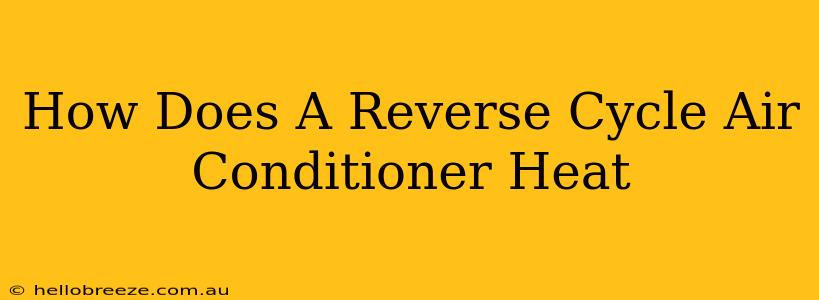Reverse cycle air conditioners, also known as heat pumps, are becoming increasingly popular for their energy-efficient heating capabilities. But how do they actually work to produce warmth in your home? It's a fascinating process leveraging the principles of thermodynamics. This guide will delve into the mechanics, explaining exactly how a reverse cycle air conditioner heats your space effectively.
Understanding the Refrigeration Cycle: The Heart of the System
The magic lies in the refrigerant, a special fluid that undergoes a cyclical process of changing state between liquid and gas. This process is the basis for both cooling and heating. Here's a breakdown:
1. Evaporation (Cooling Mode): The Basics
In cooling mode, the refrigerant absorbs heat from inside your home, turning from a liquid into a gas. This gas is then compressed and released outside, effectively removing heat from your indoor space.
2. The Reverse: Heating Mode Explained
When you switch to heating mode, the process reverses. This is the key to how a reverse cycle AC heats:
- The refrigerant, now a low-pressure gas, enters the compressor. The compressor increases the pressure and temperature of the gas significantly.
- This high-pressure, high-temperature gas then flows through the condenser coils, located outside the house. Here, it releases its heat to the surrounding air, cooling down and condensing back into a liquid.
- This now high-pressure liquid refrigerant passes through an expansion valve. This valve reduces the pressure dramatically, causing the refrigerant to evaporate and absorb heat from the inside air, passing through the evaporator coils inside your home.
- The now cool, low-pressure gas cycles back to the compressor, starting the process all over again.
Essentially, the system is extracting heat from the outside air, even on cold days, and transferring it inside your home. This is fundamentally different from resistive heating (like electric heaters), which generates heat by converting electricity directly into thermal energy—a much less efficient method.
Key Advantages of Reverse Cycle Air Conditioner Heating
- Energy Efficiency: Reverse cycle air conditioners are significantly more energy-efficient than traditional electric heaters. They move heat rather than generating it, leading to lower energy bills. Look for a unit with a high Seasonal Energy Efficiency Ratio (SEER) rating for optimal performance.
- Cost-Effectiveness: While the initial investment might be higher than some other heating systems, the long-term savings on energy bills often make them a worthwhile investment.
- Versatility: They provide both heating and cooling, eliminating the need for separate systems.
- Comfort: They offer consistent and comfortable heating, unlike some systems that produce fluctuating temperatures.
- Environmentally Friendly: Using significantly less energy contributes to a smaller carbon footprint.
Choosing the Right Reverse Cycle Air Conditioner
Selecting the right system for your needs involves considering factors like:
- Home size: The unit must be appropriately sized for your space to heat effectively.
- Climate: A unit designed for colder climates will perform better in freezing conditions.
- Budget: Balance initial cost with long-term energy savings.
- SEER rating: A higher SEER rating indicates greater energy efficiency.
Consulting with a qualified HVAC professional is crucial for proper sizing and installation to ensure optimal heating performance and efficiency.
Conclusion: Warmth from the Outside In
Reverse cycle air conditioners offer a clever and efficient way to heat your home. By skillfully manipulating the properties of refrigerant, they effectively transfer heat from the outside to the inside, providing cost-effective and environmentally conscious warmth. Understanding the process helps you appreciate the technology and choose the right system for your heating needs. Remember to always consult with a professional for installation and maintenance to optimize the lifespan and efficiency of your reverse cycle air conditioner.

